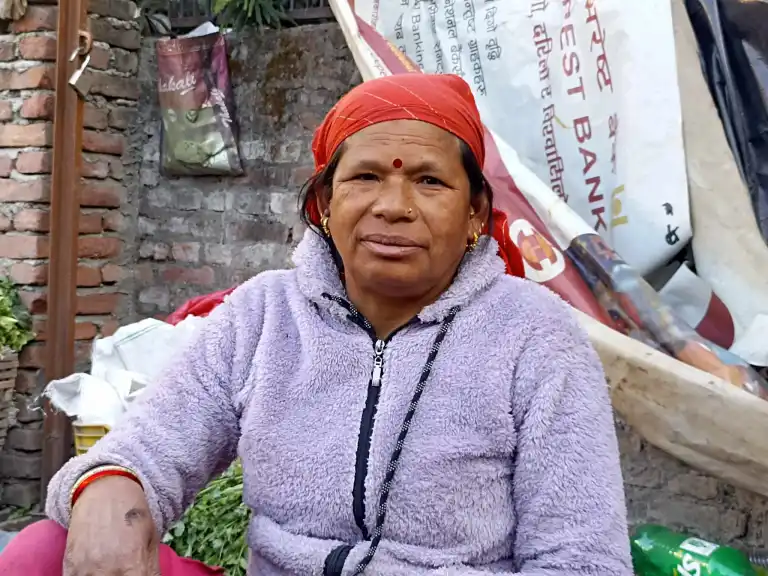KATHMANDU: For two decades now, Dilkumari Majhi, a 45-year-old woman from Sindhuli, has been roasting and selling corn in Kathmandu.
Despite lacking formal education herself, she staunchly advocated for her four children’s education.
Arriving in Kathmandu with neither education nor financial resources, Dilkumari was unfamiliar with the ins and outs of business, including the practice of renting shutters.
Yet, armed with only a few hundred rupees, she began selling corn on the streets.
Though the city authorities restricted her from selling corn, she has since settled on a small plot near Shankhamul, the owner of which remains unknown to her.
Nevertheless, she asserts her right to stay until proper documentation is provided.
“Corn cannot be sold inside a room or a shutter, and customers don’t seek it out. You have to seize the opportunity,” she remarks, emphasizing the transient nature of her trade.
She challenges, “Which landlord will offer their shutter to roast and sell corns?”
Formerly earning up to 70,000 rupees monthly by peddling her goods on foot, Dilkumari now struggles to make even 30,000. She yearns for a bustling location to maximize her sales.
In a testament to her determination, Dilkumari reveals that she financed her youngest daughter’s education in Malta through street vending, and one of her sons now resides in Dubai.
Dilkumari demands that the authorities, when removing her from the streets, provide viable alternatives for conducting business, rather than leaving her stranded.
She shares the plight of some friends who have returned to their villages, finding even there a scarcity of arable land.
Similarly, Srijana Negi, a 15-year-old from Baitadi, juggles her studies with selling vegetables near UN Park in Buddhanagar, stepping in for her mother when needed.
Meanwhile, Dilkumari Majhi’s story echoes many others in the Valley.

By day, her mother serves as an office assistant, while in the evenings, Srijana takes to the sidewalk to sell vegetables.
Her hope? To cover the family’s expenses with just a few hours of street vending each day.
But the reality is harsh. Srijana explains their inability to afford both the shutter rent and the vegetable shop, despite their best efforts. With a family of four, her mother’s salary barely covers basic needs, driving them to seek additional income sources.
Why were they chased from the streets? The reasons remain obscure, with Srijana’s family left wondering why the city would deprive even the poorest of a means to make ends meet.
Their plight reflects that of many others. According to the Nepal Self-Employed Trade Workers Association, there are an estimated 50,000 sidewalk traders in the Valley alone, supporting over 200,000 dependent family members.
Maya Gurung, the union leader, emphasizes the fluidity of this informal labor sector, where numbers fluctuate without fixed patterns.
Gurung highlights the diverse backgrounds of these street vendors, including migrants from various parts of Nepal and even India.
However, a surprising revelation is that 12 percent of these vendors are locals from Kathmandu itself, challenging the stereotype of street vendors as solely migrants.
Despite their contributions to the local economy, many face barriers to formalizing their businesses.
Gurung describes the struggles of vendors like the Raithanes, whose ancestral property is too small to rent out for income.
Without access to shutters, they resort to street vending, a precarious and transient livelihood.
Gurung questions whether these marginalized vendors are considered in political calculations, pointing out that they too are voters deserving of attention from Mayor Balen Shah and others in power.
She emphasizes the urgency of addressing hunger and poverty, accusing those in authority of being out of touch with the realities faced by street vendors.
The uncertainty of their situation looms large. Where will they conduct business next year, or even next month?
Some, like Srijana’s family, resort to short-term solutions like rooftop vending in Gaushala, but these are hardly sustainable in the long run.
The labor union has leveled serious accusations against metropolis employees, alleging that they have been absconding with confiscated goods from street vendors, effectively stealing half of the clothes, shoes, electrical items, fruits, and vegetables seized.
According to the union, a significant portion of these goods mysteriously finds its way to a store in Teku.
Expressing outrage, Netru Gurung questions where these pilfered goods end up and whose pockets they ultimately line.
She asserts that alongside their official duties, city police are supplementing their income by swiping items from street vendors.
“The metropolis has significantly boosted its revenue by auctioning off the confiscated goods of these vendors,” Gurung states.
She demands accountability from the metropolis regarding the missing items and condemns their practice of profiting from auctions.
The decision to confiscate goods from street vendors was implemented during former Mayor Bidyasunder Shakya’s tenure and remains in effect.
Gurung criticizes the stringent measures adopted, contrasting them with previous lenient policies.
Gurung accuses the current mayor of exacerbating the situation by cracking down on street vendors shortly after assuming office.
She emphasizes that while street vendors don’t necessarily demand access to roads, they do seek fair and sustainable management solutions.
The issue has also been raised in Parliament, albeit with limited progress due to the formation of a committee.
Gurung highlights the need for prompt and effective implementation of agreements reached during negotiations.
To address the root causes of the problem, a five-member task force group has been formed.
This force aims to identify issues and propose solutions, advocating for the registration of street vendors at the local level and their inclusion in tax and social security systems.
Gurung emphasizes the importance of providing opportunities for the self-employed, as many enter the labor market annually with limited options for formal employment.
She points to neighboring countries like India as examples where laws governing street vendors are more organized and supportive.









Comment